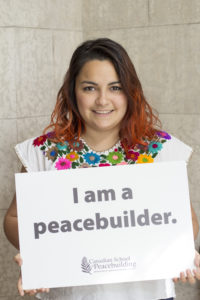CSOP Participant Profile – Andrea De Avila

by Jonathan Dyck
From Mexico to America to Canada: Trauma and Pastoring
“I found out about CSOP (Canadian School of Peacebuilding) through CMU (Canadian Mennonite University) and everyone I knew. They all said it was a great program,” Andrea De Avila says.
Andrea De Avila’s life story begins in Mexico. “I grew up as a Quaker and was only one in a thousand Quakers in Mexico. The faith and tradition that was passed down to me has meant a lot to me.”
“Our family moved to another city closer to the Mexican border, where we tried out multiple different churches and finally my dad discovered a Mennonite church,” she says. “He only knew Mennonites as people who ‘sold cheese’ at that point.”
This was De Avila’s first connection to the Mennonite community. Later she attended Eastern Mennonite University (EMU) in Virginia, got married, and moved to Winnipeg.
De Avila, 27 years old, is now the Associate Pastor at Sargent Mennonite Church in Winnipeg. “My reason for joining CSOP was to learn from different profs and to immerse myself in the world of peacebuilding,” she says. She feels the class she took at the 2018 CSOP—Trauma, Peacebuilding, and Resilience – Level 1— is relevant to her work. “As a pastor, people trust you, and because of that a lot of people tell you their stories of trauma and resilience.”
De Avila feels it is crucial to learn about peacebuilding and help people through trauma they experience through witnessing violence. This is exactly what Vicki Enns, Clinical Director of the Crisis & Trauma Resource Institute, and Wendy Kroeker, Assistant Professor of Peace and Conflict Transformation Studies at CMU, equipped students to do in their class. “I learned very practical ways of grappling with trauma and finding a centering point,” says De Avila.
In her class, De Avila talked about the conflicts behind the United States election and how it related to peacebuilding. “Something that I reflected on in class was that there were two different ways of interpreting the last U.S. election. Something important to know about the CSOP program is that they do not have any biases on anything. When they discuss the 2016 election, they do not do it with an “anti-Trump” agenda … but rather they examine both sides and try to rationalize why people support Trump.” “On one hand there is hearing people's fears, and on the other hand, there was inviting people to listen to that discontent.” CSOP is very informative in terms of understanding why the world is the way it is and presenting it in a way that doesn’t have any biases.
What Andrea learned through her CSOP studies will always be important to her, not just in her work as a pastor, but also in her understanding of the world around her.







